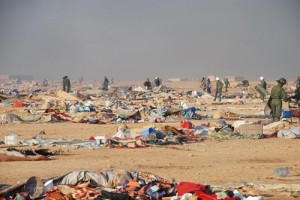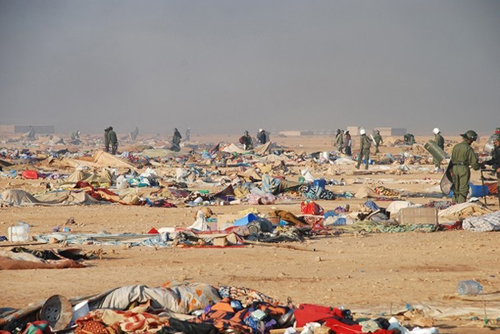Associated Press
by Edith M. Lederer

Rebels seeking independence for Western Sahara warned Thursday that “the shortest way to the resumption of war” is if the U.N. ends its peacekeeping mission in the disputed territory – and they say that’s Morocco’s aim.
The Polisario Front’s U.N. representative, Ahmed Boukhari, spoke to reporters after Morocco ordered 84 international staff in the peacekeeping mission to leave within three days and reiterated the country’s termination of $3 million in funding for the U.N. operation, to protest recent remarks by Secretary-General Ban Ki-moon.
Boukhari told reporters that the U.N. Security Council must defend the U.N. presence in Western Sahara.
“If there is no mission, there is a vacuum and an invitation to war,” he said.
Morocco annexed Western Sahara, a former Spanish colony, in 1975 and fought the Polisario Front until the U.N. brokered a cease-fire in 1991. The U.N. mission was established to monitor the cease-fire and help organize a referendum on the future of the vast, mineral-rich territory. But the referendum has never taken place because of disputes over voter lists.
Morocco considers Western Sahara its “southern provinces” and has offered the region autonomy, but the Polisario Front insists on self-determination through a referendum for the local population.
The Security Council met behind closed doors Thursday afternoon to hear a briefing from U.N. political chief Jeffrey Feltman and discuss Morocco’s actions.
Angola’s U.N. Ambassador Ismael Gaspar Martins, the current council president, signaled deep divisions in the U.N.’s most powerful body, briefly telling reporters afterward that the council “expressed serious concerns” and decided that the 15 members should engage with Morocco “to make sure that the situation is stabilized.”
U.N. diplomats said Feltman told the council that Morocco’s “precipitate action” would make it impossible for the U.N. mission, known as MINURSO, to carry out its mission. He said the U.N. wants “cancellation or mitigation” of Morocco’s punitive actions against MINURSO, a return to a normal relationship, and a quick resumption of negotiations on Western Sahara’s future – and he stressed that the U.N. was counting on the council’s “unified support,” the diplomats said.
But there was a total lack of consensus among the 15 members, with France, Egypt, Senegal, Spain and Japan supporting Morocco, the diplomats said, speaking on condition of anonymity because consultations were private.
Feltman warned that if the peacekeeping mission can’t function, the vacuum created could be exploited by Morocco, the Polisario Front or others, which would threaten international peace and security, the diplomats said.
The latest dispute, which led to a massive protest in Morocco on Sunday, was sparked by the U.N. chief’s use of the term “occupation” in describing Western Sahara’s territorial status during his visit this month to refugee camps in Algeria for the Sahrawis, as the region’s native inhabitants are known.
Morocco’s Foreign Minister Salaheddine Mezouar told a news conference for French and Arab media on Thursday that “like all the countries in the world, we do not accept injustice or insult wherever it comes from.”
Mezouar said the decisions about MINURSO were “irreversible,” but he said “Morocco has left pending other decisions.” They include a threat to withdraw its 2,300 troops from all U.N. peacekeeping operations.
U.N. spokesman Stephane Dujarric called Morocco’s order for 84 U.N. civilian staffers to leave within three days “unprecedented,” saying past issues with countries over U.N. peacekeeping missions were worked out within months, not days.
According to diplomats, Feltman said he received a text message just before the council meeting from Morocco’s U.N. ambassador saying that within three days had been extended to “within the days to come.”
Dujarric said U.N. peacekeeping officials are planning for a number of possible contingencies, including terminating the mission. He said Morocco’s order was “in clear contradiction” of its international obligations.
According to the U.N. peacekeeping department, Kim Bolduc of Canada, who heads the mission, and other senior people were not ordered out.
Diplomats said Feltman told the council that deescalating the situation will not be easy because the U.N. is committed to negotiations that lead to agreement on the final status of the territory, while Morocco insists that autonomy is the only option, and that its real negotiating partner is Algeria, which supports the Polisario Front.







